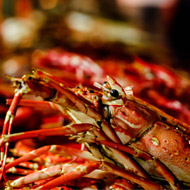Gove urged to recognise sentience of decapod crustaceans

An EU panel has stated that many of the methods of slaughtering decapods are inhumane.
A letter signed by more than 50 high profile campaigners is urging Michael Gove to include decapod crustaceans in animal welfare laws.
There is currently no legal requirement for food processors, supermarkets or restaurants to consider the welfare of decapods including lobsters, crabs, prawns, crayfish and shrimp. Yet a body of scientific evidence has emerged over the past decade that strongly suggests they are capable of experiencing pain.
Campaigners are calling on the government to recognise them as sentient beings, including them in the definition of ‘animal’ in the Animal Welfare Act 2006 and the Animal Welfare Bill (Sentencing and Recognition of Sentience).
The letter to environment secretary Michael Gove has been signed by animal welfare experts, vets, celebrities such as Chris Packham and Bill Bailey and veterinary organisations including the BVA, AWF, British Veterinary Zoological Society and the Fish Veterinary Society. A petition on Change.org has garnered more than 22,000 signatures.
Crustacean Compassion, which co-ordinated the letter, says decapods are often crammed together in unsuitably bright tanks with no consideration for their welfare and are frequently sold live to the consumer for amateur home storage and killing. Live crabs have also been seen on sale, completely immobilised by shrink-wrap. Authorities were powerless to prosecute, however, as crabs are not covered by the legislation.
An EU panel has stated that many of the methods of slaughtering decapods are inhumane. Boiling alive is a common slaughter method but research suggests edible crabs may remain conscious for at least three minutes after being dropped into boiling water. Furthermore the legs, head or tail are often broken off before killing.
Decapod research has shown evidence of pain experience including avoidance learning, rapid behaviour change, prolonged rubbing of affected areas, laying down of memories and motivational trade-offs. These animals are already protected under animal welfare laws in Norway, Switzerland, Austria, New Zealand and some Australian states and territories, as well as some parts of Germany and Italy.
Including these animals in UK welfare legislation would mean that anyone farming, storing, or slaughtering them would be required to meet their basic welfare needs, which includes providing enough food, decent water quality, protection from pain and suffering and humane slaughter.



 The RCVS has announced a new version of its 1CPD mobile app, with enhanced features for veterinary surgeons and veterinary nurses to record their continuing professional development.
The RCVS has announced a new version of its 1CPD mobile app, with enhanced features for veterinary surgeons and veterinary nurses to record their continuing professional development.